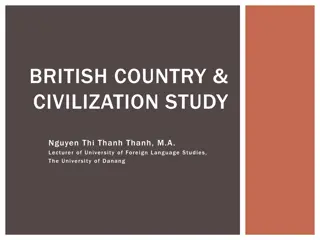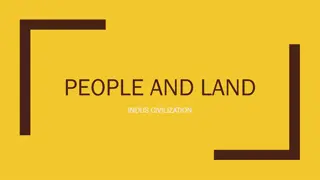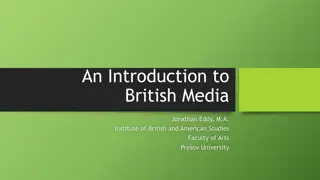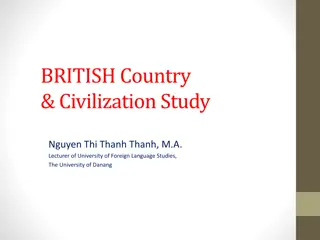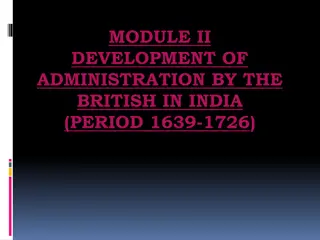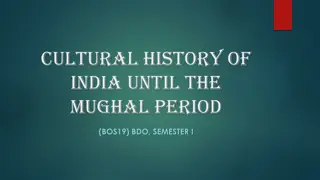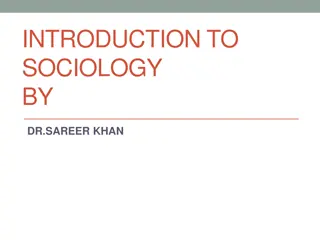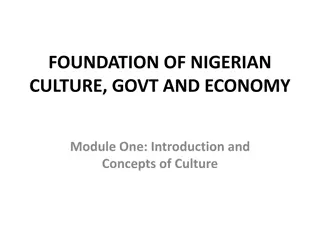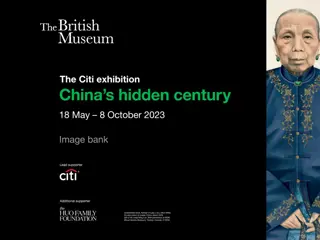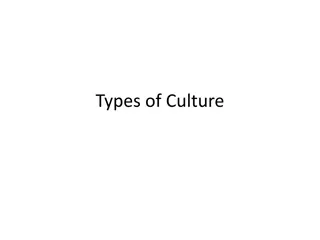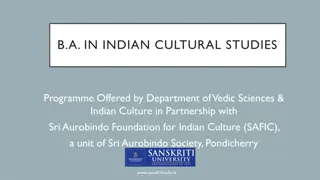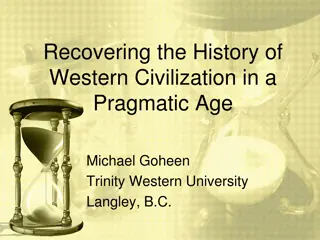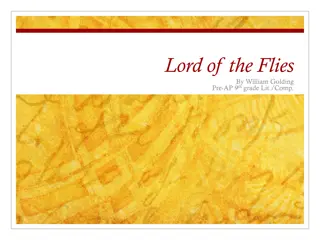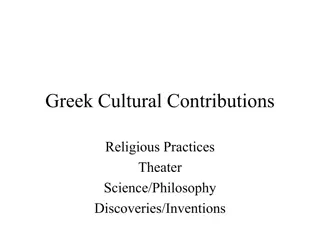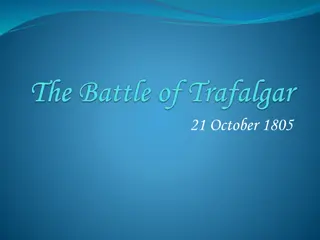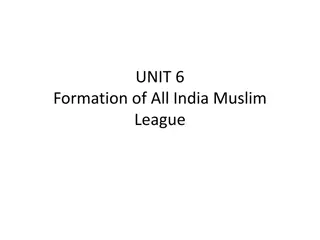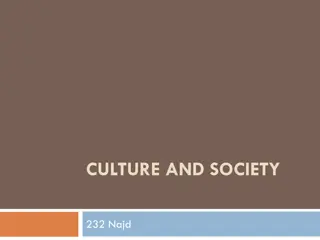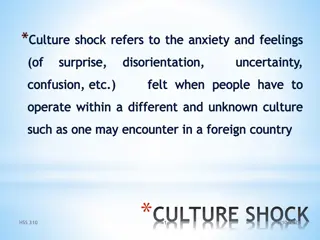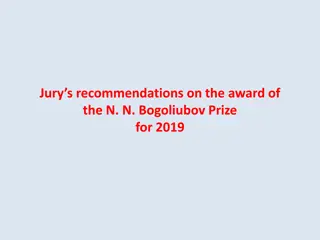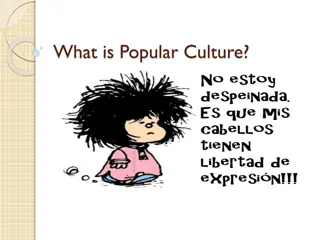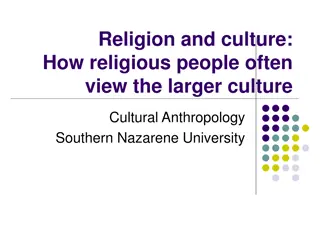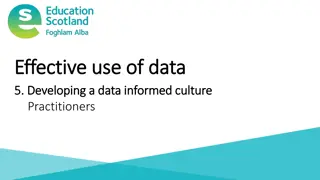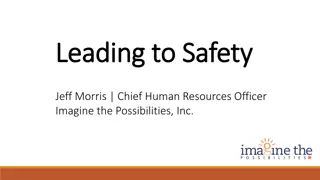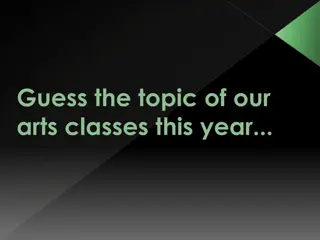Understanding British Culture and Civilization: Insights from Nguyen Thi Thanh
Explore the nuances of British identity, language, and multiculturalism through the expertise of Nguyen Thi Thanh, a lecturer at the University of Danang. Discover the distinctions between Great Britain, the United Kingdom, and the British Isles, as well as the linguistic diversity and immigration history of the region.
Download Presentation

Please find below an Image/Link to download the presentation.
The content on the website is provided AS IS for your information and personal use only. It may not be sold, licensed, or shared on other websites without obtaining consent from the author. Download presentation by click this link. If you encounter any issues during the download, it is possible that the publisher has removed the file from their server.
E N D
Presentation Transcript
BRITISH COUNTRY & CIVILIZATION STUDY NGUYEN THI THANH THANH, M.A. LECTURER OF UNIVERSITY OF FOREIGN LANGUAGE STUDIES, THE UNIVERSITY OF DANANG
PEOPLE AND PEOPLE AND LANGUAGE LANGUAGE NGUYEN THI THANH THANH, M.A. LECTURER, UNIVERSITY OF FOREIGN LANGUAGE STUDIES UNIVERSITY OF DANANG
WHO ARE THE BRITISH? WHO ARE THE BRITISH? Why British not English? England = Britain/ the UK??? English = British?
WHO ARE THE BRITISH? WHO ARE THE BRITISH? NOT ENGLISH BRITISH JUST ENGLAND IS BOTH ENGLISH AND BRITISH
WHO ARE THE BRITISH? WHO ARE THE BRITISH? So, what is the difference? between the names Great Britain and the United Kingdom - and what about the British Isles ? The United Kingdom = the United Kingdom of Great Britain (England, Scotland, Wales) + Northern Ireland The British Isles is the geographical name that refers to all the islands off the north west coast of the European continent: Great Britain, the whole of Ireland, the Channel Islands and the Isle of Man.
LANGUAGE LANGUAGE Scottish Gaelic and Irish Gaelic are still spoken now and officially encouraged and taught in schools. English developed from Anglo-Saxon and is a Germanic language However, all the invading peoples, particularly the Norman French, influenced the English language Some still have French origin. Nowadays all Welsh, Scottish and Irish people speak English but all the countries have their own special accents and dialects.
MULTIRACIAL BRITAIN MULTIRACIAL BRITAIN Recently, there have been many waves of immigration into Britain and movement within the UK. For example, many people from Wales, Scotland and Ireland; Jews, Russians, Germans, and Poles have come to Britain (particularly London) Commonwealth citizens were allowed free entry into Britain until 1962. Before the World War II, these immigrants were mostly people from Canada, Australia, New Zealand and South Africa. The new immigrant communities: is encouraged to continue speaking their own languages as well as English.
MULTIRACIAL BRITAIN MULTIRACIAL BRITAIN This latest wave of immigration has caused problems: racial tension and racial prejudice in Britain today There is stilldiscrimination against Asian and back people, many of whom are unemployed or in low-paid jobs. However, the atmosphere is improving. British culture is being enriched through its contact with other cultures. For example, the British are becoming more adventurous in their cooking and eating habits, and Chinese, Indian and Pakistani restaurants are very popular. the pop music: where West Indian music has become very influential.
EXERCISE Write T for true and F for False. Correct the false information T Invaders languages influenced the English language. T People from the 4 countries of Britain speak English. Southern English accent is taught to foreigners. F People from Wales, Scotland, England and Northern Ireland F can understand one another easily. T T The British government encourages immigrant communities to speak their own languages and English. T British culture is enriched through its contact with immigrants cultures.
THE ENGLISH LANGUAGE THE ENGLISH LANGUAGE The roots of English English began as a west Germanic language (brought to England by the Saxons around 400 AD). Old English was the spoken and written language of England between 400 and 1100 AD. Old English was very different from modern English and only a few words can be easily recognized. From the Norman Conquest (1066) until the late 12th century, English was replaced as the official language by Norman French, though English was still used by the lower classes (Middle English) English was influenced by French and also Latin in vocabulary and pronunciation. French brought many words connected with government, e.g. sovereign, royal, court, legal, and government itself.
THE ENGLISH LANGUAGE THE ENGLISH LANGUAGE The development of Modern English Modern English developed from the Middle English dialect of the East Midlands and was influenced by the English used in London English changed a great deal from this time until the end of the 18th century. During the Renaissance, many words were introduced from Greek and Latin to express new ideas, especially in science, medicine and philosophy. The development of printing helped establish standards of spelling and grammar. Samuel Johnson s A Dictionary of the English Language (1755), was the first authoritative treatment of English.
THE ENGLISH LANGUAGE THE ENGLISH LANGUAGE English is now an international language and is used as a means of communication between people from many countries. As a result the influences on the English language are wider than ever and it is possible that World English will move away from using a British or American standard and establish its own international identity. (from Oxford Guide to British and American Culture, p.178)
SUMMARY: PEOPLE & LANGUAGE Who are the British? Why British, not English? Great Britain and the United Kingdom the British Isles ? Language The multiracial Britain The English Language The root of English The development of Modern English English as an international language
THANK YOU FOR YOUR LISTENING



